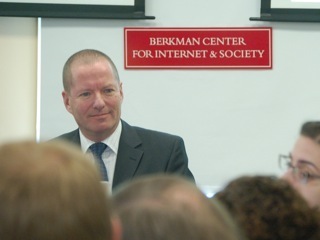Shai Reshef on Educating the Many, Not the Few
April 13th, 2010
The lack of universal access to higher education impacts not only the lives of individuals — their income, health and quality of life — but the societies in which they live — crime rates, social awareness and economic stability. Shai Reshef — Founder & President of the University of the People and named one of the most creative people in business by Fast Company magazine — talks about the world’s first tuition free online university, addressing barriers and bridges to education, the impact of the Internet on learning platforms, UoPeople and the challenges he faces implementing this model.
Click Above for Video
…or download the OGG video format!
Entry Filed under: video
2 Comments Add your own
Leave a Comment
Some HTML allowed:
<a href="" title=""> <abbr title=""> <acronym title=""> <b> <blockquote cite=""> <cite> <code> <del datetime=""> <em> <i> <q cite=""> <s> <strike> <strong>





1. S.F. | April 22nd, 2011 at 6:35 pm
University of the People is a wonderful concept, but its implementation leaves much to be desired. I know this first-hand–I am currently enrolled at the university. There are many problems with the de facto learning experience at the university:
1. No enforcement of the Academic Honesty and Integrity policy. Plagiarism is covered in the first two required courses at the university, yet it is the rule rather than the exception in the discussion forums. It is also commonplace in assignments that require explanations (e.g. non-computational questions/problems). In fact, plagiarism is so prevalent that if one brings up the fact that a fellow student’s submission is completely cut-and-pasted from Wikipedia, he is likely to be told that “this is the way we do it in all our classes.”
2. Flawed assessment model. Courses consist of discussion forums, learning journals, quizzes, assignments, and a final. The final, usually a multiple choice test of 5-10 problems to be completed in one hour (and usually completed in 20 minutes), is worth 40% of the student’s grade. At no other university I have attended did any course place so much weight on an exam that did not challenge the student nor represent the material covered throughout the quarter. The discussion forums are of questionable worth for the reasons stated above. On top of these issues, the lowest one or two scores is dropped from among the graded areas (DFs, assignments, etc.), allowing a student to forgo 1/9 to 2/9 (or more) of a quarter’s worth of work (excluding the final) and suffer no penalty. Such non-participation would likely reduce a student’s grade by one or two letters at a real university. This is related to the courses’ inadequate and un-enforced Participation policy.
3. Lack of uniformity in grading. Peer assessment is part of the learning model. Unfortunately, you are just as likely to have a student who himself does not understand the material grading your assignment (this makes a huge difference, even though solutions are provided) as you are another student whose assignment received a 20 and is now out for blood. This is also a problem in the discussion forums.
I want the university to succeed, but more than that I want a degree from this university that actually means something. As I note the lack of quality in my fellow student’s work, the lack of effort put into plagiarized posts and assignments that will, regardless, likely get an A, I find it hard to believe that even 30% of UoP’s students could cut it in a real university. I don’t see how, with things the way they are now, University of the People could possibly become accredited. Sad thing is, there are UoP students that are now more than half-way done with their four-year degree who have no notion of what an actual education is and who would probably flunk out of their first year at any two-year college.
I can only hope that someone at UoP wakes up and appreciates the sad state of its affairs, the joke that UoP, in practice, has become and decides to do something about it.
2. Khandakar | April 5th, 2016 at 4:51 pm
I’m going to complete my AS degree by next term.
Thanks to Mr. Shai Rashef for this wonderful concept. I really enjoyed studying in this university.
Some students may think peer assessment policy is controversial. But I think this is good for students. Besides their learning students also should learn how to evaluate. 10% marks of each assignment is reserved for assessment. SO, a student who will assess successfully will get full marks for assessment. Otherwise, marks will be deducted. Moreover, if a student finds his/her assignment is wrongly judged he/she can ask instructor to review. So, I don’t find any issue.
Discussion Forum is an open area where all students can see and discuss. Most of the cases, instructor is supposed to be silently observe and inspire by providing some valuable information. So, a student’s post is rated by many other students. If plagiarism is detected he/she must be warned by other students.
Finally, University of the people’s policy is zero tolerance about plagiarism. Since I admitted, in many courses I found the university provided enough materials that taught how to overcome plagiarism. I’d like to mention:
1. Online strategies: This course teaches how to study, what is plagiarism, how to write documents and overcome plagiarism, punishment of plagiarism etc.
2. Ethics & Social responsibilities: In every learning journal I found clear policy of point deduction if plagiarism detected.
Likely many other courses e.g. Art History, Greek and Roman Civilization, English Composition etc.
I believe, University of the People is clearly advanced than any other university regarding plagiarism policy.
The only issue I think: What happens if a student’s internet stops working during exam ? There is no recovery as a student can take only one attempt.
I wish the university the best and I believe this model can change the world.